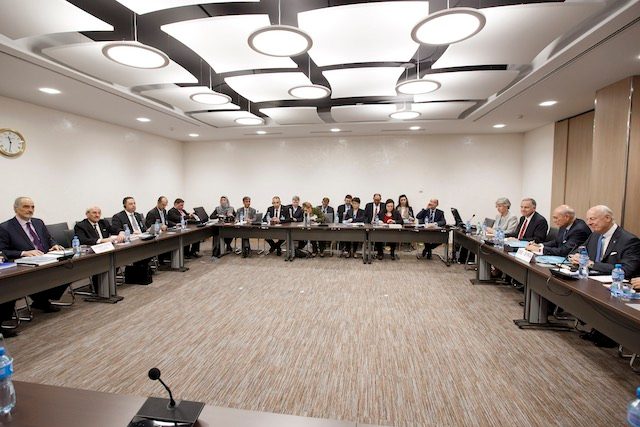SUMMARY
This is AI generated summarization, which may have errors. For context, always refer to the full article.

MOSCOW, Russia – Russian President Vladimir Putin on Monday, March 14, announced the withdrawal of Moscow’s forces from Syria in a shock move as fresh peace talks began in Geneva.
But hopes for a breakthrough at the talks remained remote with both sides locked in a bitter dispute over the future of Syrian President Bashar al-Assad on the eve of the fifth anniversary of the brutal conflict.
The Kremlin said Putin had called Assad to inform Moscow’s long-standing ally of the move that appears to end the main part of its controversial bombing campaign that began in September.
“The task that was set before our defense ministry and armed forces has as a whole been completed and so I order the defense ministry to from tomorrow start the withdrawal of the main part of our military contingents from the Syrian Arab Republic,” Putin told Defense Minister Sergei Shoigu in televised comments.
“The leaders noted that the actions of the Russian air force (had) allowed (them) to radically change the situation in the fight against terrorism, to disorganize the fighters’ infrastructure and inflict significant damage on them,” the Kremlin said in a statement.
The White House said presidents Barack Obama and Vladimir Putin had spoken following Russia’s surprise announcement, and discussed the “next steps required to fully implement the cessation of hostilities”.
But US officials offered a cautious initial assessment of the Kremlin’s decision.
“At this point, we are going to see how things play out over the next few days,” a senior administration official told Agence France-Presse.
‘Courage and heroism’
Putin and Assad agreed that Moscow would maintain an air force facility in Syria to help monitor the progress of a ceasefire in the war-torn country.
“The Syrian leader underlined his readiness for the quickest establishment of the political process in Syria,” the statement added.
Russia’s decision to begin withdrawing from Syria will help Moscow intensify efforts to reach a political settlement, the Russian ambassador to the United Nations said.
“Our diplomacy has received marching orders to intensify our efforts to achieve a political settlement in Syria,” Ambassador Vitaly Churkin told reporters ahead of a UN Security Council meeting on Syria.
German Foreign Minister Frank-Walter Steinmeier said the move would increase the pressure on President Assad to negotiate “a political transition”.
Russia began its airstrikes in support of Assad’s forces in September, a move that helped shore up the regime’s crumbling forces and allow them to go on the offensive.
Russia sent over 50 warplanes to carry out thousands of strikes across the Syria arguing that it was targeting “terrorist” groups including Islamic State jihadists.
The intervention was slammed by the West and its regional allies, who insisted that Moscow was mainly bombing more moderate rebels fighting Assad.
A temporary ceasefire between Assad’s forces and opponents in the country introduced on February 27 has largely held, but it does not cover the ISIS and Nusra front groups.
Kremlin spokesman Dmitry Peskov told journalists that Moscow’s Hmeimim air base in Syria and its Tartus naval facility would remain functioning and that some military contingents would stay behind.
He did not however give any details on how many soldiers would stay in Syria and what the timeframe for withdrawal was.
‘A positive decision’
The UN-hosted negotiations in Geneva are the latest effort to end violence that has killed more than 270,000 people and displaced millions.
Syria’s main opposition hailed the Kremlin’s withdrawal announcement, but said it would wait and see what impact the order would have on the ground.
“We must verify the nature of this decision and its meaning,” Salem al-Meslet, spokesman for the opposition High Negotiations Committee, told reporters in Geneva.
“If there is a decision to withdraw the (Russian) forces, it is a positive decision, and we will see it on the ground (but) does this decision mean removing forces or just reducing the number of aircraft in Syria, (that) we will have to check,” he said.
Hopes for a breakthrough at the talks, however, appeared remote with the sides locked in a bitter dispute over Assad’s future.
As the Syrian delegations arrived in Geneva over the weekend, Damascus warned that any discussion about removing Assad would be a “red line”.
Top Western diplomats immediately condemned the comment from Syrian Foreign Minister Walid Muallem as divisive and provocative.
After his first official meeting with the regime on Monday, UN envoy Staffan de Mistura told reporters that “strong statements (and) rhetoric” were part of every tough negotiation and that his initial discussions with government representative Bashar al-Jaafari were “useful”. – Max Delany with Layal Abou Rahal in Geneva, Switzerland, AFP / Rappler.com
Add a comment
How does this make you feel?
There are no comments yet. Add your comment to start the conversation.